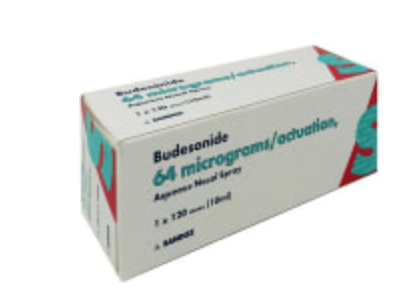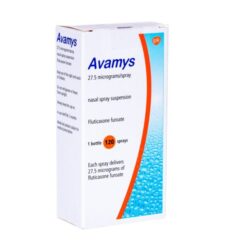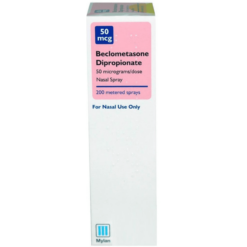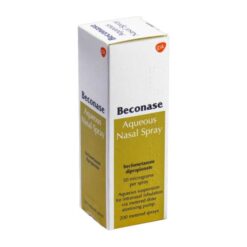
£16.99
Variety of delivery options including next day & free delivery.
Pharmacy, clinic and prescribers based in Greater Manchester.
Start your treatment with a quick and free online consultation.
 This is a prescription product.
This is a prescription product.You need to complete a consultation form and allow our pharmacists to access your NHS records for review before we can issue this treatment.
Variety of delivery options including next day & free delivery.
Pharmacy, clinic and prescribers based in Greater Manchester.
Start your treatment with a quick and free online consultation.
Fill in a quick online consultation for our licensed pharmacists to review.
Our pharmacists will review your treatment to ensure it’s suitable.
Your treatment will be delivered to your door quickly & discreetly.
Budesonide Nasal Spray is a nasal spray for relieving rhinitis symptoms, including nasal congestion, sneezing, and runny nose. Designed for allergies such as hay fever, it helps reduce inflammation, providing quick and effective relief from discomfort.
Budesonide Nasal Spray is a steroid-based treatment primarily used to treat allergic rhinitis and nasal polyps. It works by reducing nasal inflammation caused by allergens, providing relief from symptoms such as congestion, itching, and sneezing, thereby improving breathing and overall comfort. Polyps are tiny growths in the nose that can trigger symptoms similar to those of rhinitis.
Budesonide, the active component, is a corticosteroid that targets inflammation within the nasal passages. Reducing swelling and irritation effectively alleviates symptoms caused by allergic rhinitis and nasal polyps. This results in easier breathing and a significant reduction in nasal discomfort.
The usual maximum dosage for adults is two sprays in each nostril once daily or one spray in each nostril twice daily. It’s essential to adhere to the prescribed dosage to avoid potential side effects and ensure the medication’s effectiveness.
Individuals with certain medical conditions, such as nasal infections, recent nasal surgery, or tuberculosis, should avoid using Budesonide Nasal Spray. Additionally, pregnant women, breastfeeding mothers, and children under 12 should consult their GP or midwife before use.
When using Budesonide Nasal Spray, follow the steps below:
You may find that leading your head slightly forward will make using the nasal applicator more comfortable.
After use, you should clean the spray with a clean tissue and replace the cap.
Regular, consistent use as directed by your doctor ensures the best results.
Budesonide Nasal Spray side effects are usually temporary and improve with continued use.
While these are typically mild, monitoring symptoms and seeking medical advice if they become bothersome or persistent is important. If severe side effects occur, stop using Budesonide Nasal Spray and consult your GP, call 111 or visit A&E for further advice.
If you experience any side effects, tell your doctor or pharmacist. Adverse side effects should be reported to the MHRA (Medicines and Healthcare products Regulatory Agency) to ensure safe use. Reporting helps track the medication’s safety for all users.
Our online allergy clinic offers several alternatives to Budesonide Nasal Spray. These include other corticosteroid nasal sprays such as Beclometasone, Beconase, and Dymista Nasal Sprays, which can also be purchased online.
Active ingredients: Budesonide
Inactive ingredients: disodium edetate, potassium sorbate (E202), glucose (anhydrous), microcrystalline cellulose (E460), carboxymethylcellulose sodium (E466), polysorbate 80 (E433), hydrochloric acid, purified water.
It’s important not to exceed the recommended dosage of Budesonide Nasal Spray. Patients with a history of nasal infections or those who have recently undergone nasal surgery should use this medication with caution and under medical supervision.
EXCELLENT
Consult your doctor or midwife before using Budesonide Nasal Spray during pregnancy to ensure it is safe for you and your baby.
Budesonide Nasal Spray requires a prescription from a licensed pharmacist or GP in the UK. However, you can buy it over the counter from our online allergy clinic after completing a short consultation with our pharmacists to review the suitability of the treatment for your symptoms and any other medical conditions.
Yes, Piriton (an antihistamine) can generally be taken with Budesonide Nasal Spray, but it’s best to consult your pharmacist or doctor to ensure there are no interactions.
Budesonide Nasal Spray does expire, so it’s important to always check the expiration date on the packaging and not use it past this date.
The typical maximum dosage for adults is two sprays in each nostril once daily or one spray in each nostril twice daily. Following your doctor or pharmacist’s specific dosage instructions is important to ensure safety and effectiveness. Avoid exceeding the recommended number of sprays to prevent possible side effects.
If you miss a dose, take it as soon as you remember unless it’s close to the time for your next dose. Do not double up to make up for the missed dose.
If you have taken too much Budesonide Nasal Spray, seek immediate medical attention. Symptoms of overdose may include severe nasal irritation or nosebleeds.
Although there are no direct interactions between the nasal spray and alcohol, we do not recommend drinking alcohol while taking Budesonide Nasal Spray as drinking alcohol can potentially worsen the side effects of the medication or aggravate your symptoms.
Drowsiness is not a common side effect of Budesonide Nasal Spray. If you experience unusual tiredness from using this medication, do not continue to use it and consult your GP for advice.
It may take a few days to notice the full effect of Budesonide Nasal Spray for hay fever symptoms. For nasal polyps, symptoms may take up to several months to improve. Consistent use as directed is important for achieving the best results. If symptoms do not improve, reach out to our clinicians to discuss an alternative treatment or book an appointment with your GP.
Yes, Budesonide Nasal Spray is used to treat hay fever. As a corticosteroid, it reduces inflammation in the nasal passages, helping alleviate symptoms like congestion, sneezing, and runny nose. It can significantly relieve hay fever symptoms when used consistently and as directed, making it a strong option for managing pollen-based allergies.
Budesonide Nasal Spray primarily treats nasal symptoms and may not directly help with itchy eyes. For itchy eyes, eye drops designed for allergies might be more effective.
Brand names for Budesonide Nasal Spray include Rhinocort, Budenase AQ, and Budeflam.
Budesonide Nasal Spray does not need to be used at a specific time of day, but it is important to use it consistently at the same time each day to maintain an even level of the medication in your body. Whether you choose to use it in the morning or evening, stick to a routine and your dosage instructions to achieve the best results.
When used consistently, Budesonide Nasal Spray is an excellent treatment for rhinitis. I recommend using it from a few weeks before allergy season starts and following the prescribed dosage for maximum effectiveness.

Dr Hussain Ahmad
Page content authored by Dr Hussain Ahmad, last reviewed by Amjad Khan on 10th February 2025.











